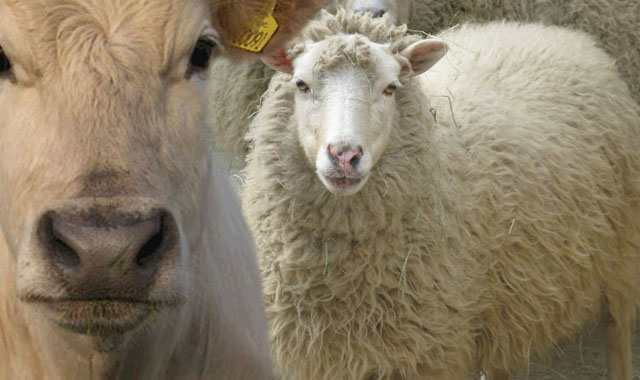April 29, 2012
John 10: 11-18
Today’s Gospel is one of several places in the New Testament where Jesus is associated with a shepherd. If Jesus is the shepherd, then we are the sheep. Now I must admit that it is not uncommon for people to approached me and complain about this image. They point out that sheep are dirty and dull animals—animals with which they are not flattered to be compared. As one man told me, “I am a beloved child of God, not some clueless farm animal!”
The point is well taken. Yet the Scriptures do not present sheep to us in order to imply that we are sheep. We are not sheep. For that matter, neither is Jesus a shepherd. But the image of shepherd and sheep is used to say something about our relationship to God. Therefore, today, rather than being distracted by the animal imagery, I would like to ask what is useful about it. How does the image of sheep help us understand our relationship to God.
I think the place to begin is by noting that sheep are different from cows. Cows are rather confident animals. They are not easily panicked. So if you own a number of cows, you are able to herd them. You can stand behind them and shake a stick or make a loud noise and the cows will look back and say, “I don’t know what that person is doing, but I want to get away from him.”—and together they will move ahead as a group. You can herd cows by getting behind them and pushing them forward.
Sheep are different. They are not as confident as cows and are easily shaken. If you stand behind a group of sheep and shake a stick or make a loud noise, they will panic and disperse in every direction. The only way you can move a group of sheep forward is by having them trust you. Then when they hear your voice, they will follow it. In other words, sheep cannot be herded. They must be led.
The image of sheep, then, says something important about our relationship with Christ. Jesus wants to move us. But he does not want to move us by disturbing us, but by attracting us. Jesus does not want us to be with him because he can force us to be with him, but because he is worthy of our trust. In other words, Jesus desires a relationship that is built not on fear but on love. This is an important insight for us because we may at one time or another see our own faith more in terms of obligation than grace. This is inappropriate, because the gospel is much more positive than it is negative. The Gospel is much more about embracing God’s love than following God’s commands.
Now don’t get me wrong. We should follow God’s commands. We do have obligations to meet, and there are consequences for not meeting them. But Jesus is always calling us to relate to him on a higher level. Does he want us to come to church? Yes. But he wants us to come to church, not out of obligation, but because we know that we can experience God’s presence and joy when we come together. Does he want us to treat all people with respect? Yes, he does. But he wants us to do this not because we would be embarrassed if people saw how narrowly we think and judge one another, but because we perceive in each person the image of God. Does he want us to forgive our enemies? Yes, he does. But he wants us to forgive our enemies, not because he has commanded it, but because we realize that there is no greater satisfaction than to experience the healing which comes from reconciliation.
Jesus does not want to push us. He wants to lead us. If his purpose was to force us to the place we needed to go, we would be cows and he would be the herdsman. But he says that he is the shepherd and we are the sheep. He calls us sheep because he wants to attract us by the sound of his voice, so that trusting him we might follow him into the Kingdom of God.


I needed this =).
Im quite relieved reading this. As i havent reach the sheep level or did and have dropped back. But im at cow level. I still need the shepherd to herd me. But it also could mean im not recognising the sheperds voice.